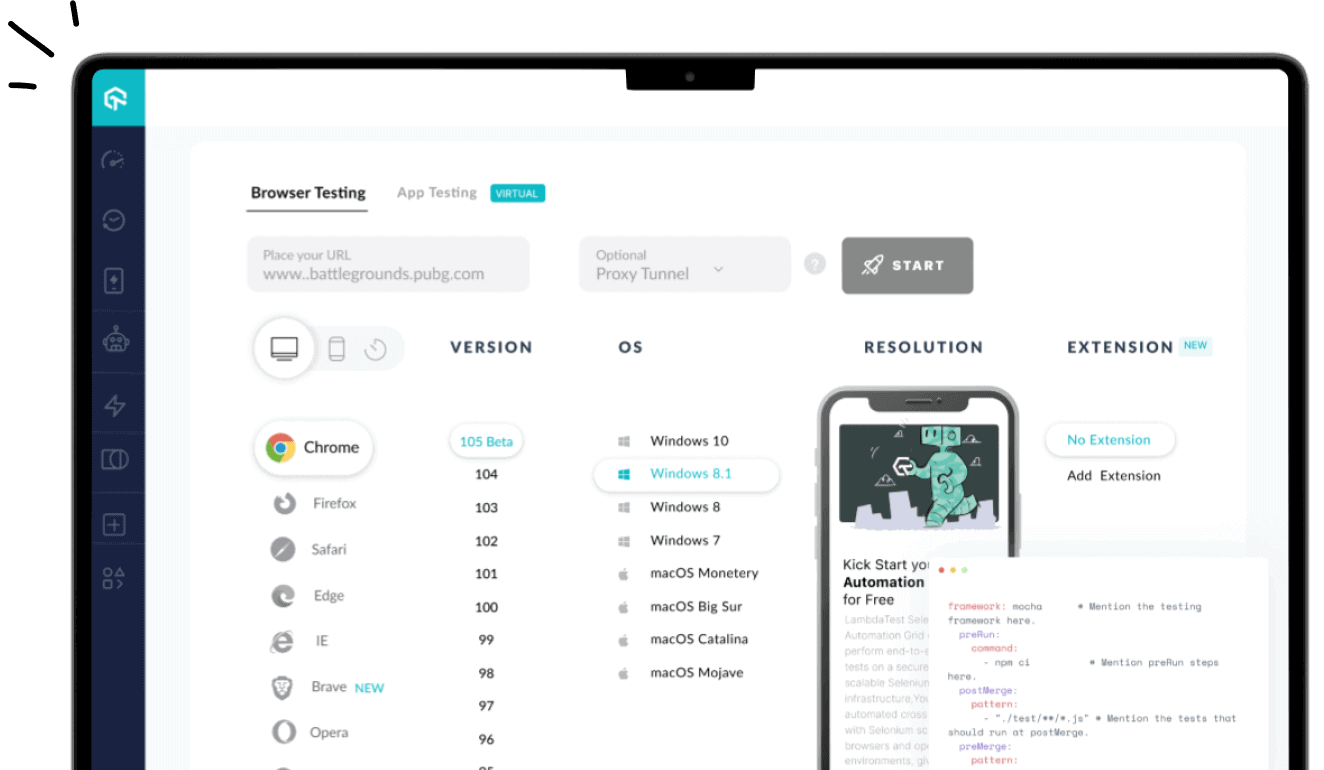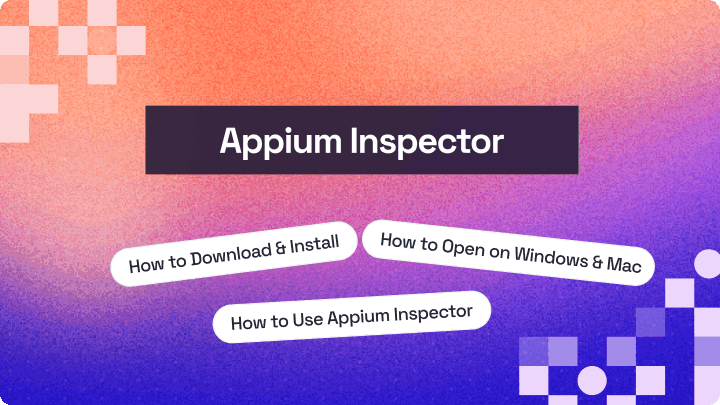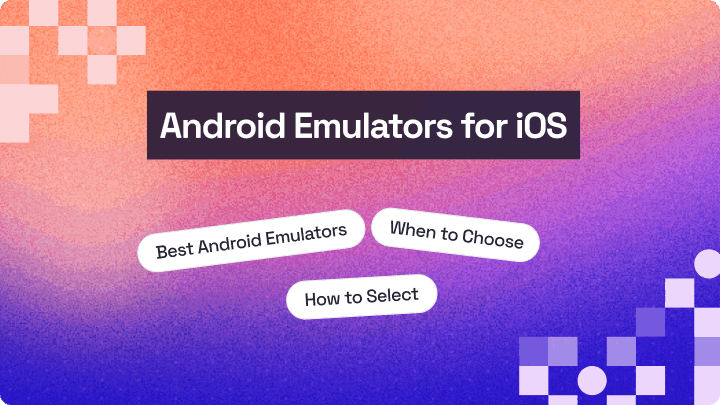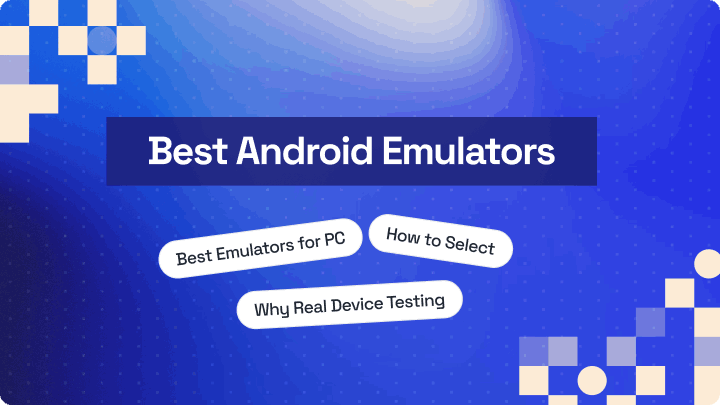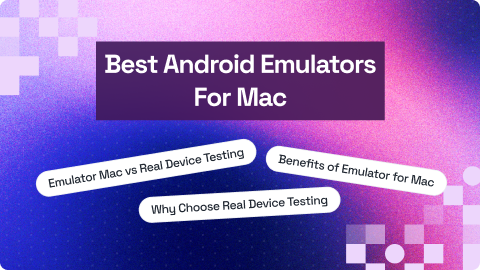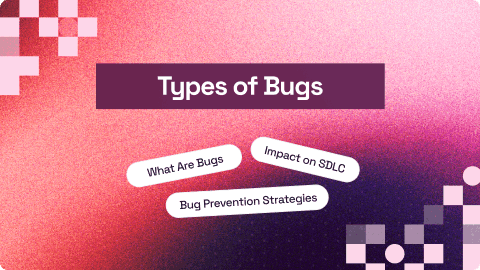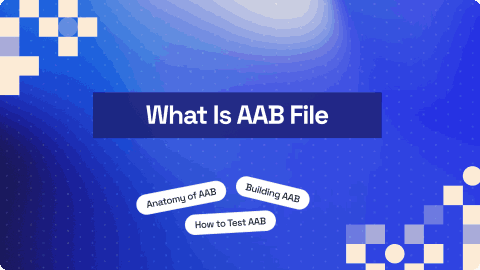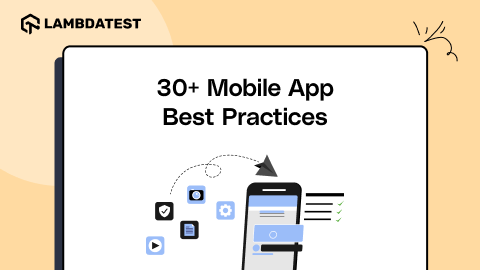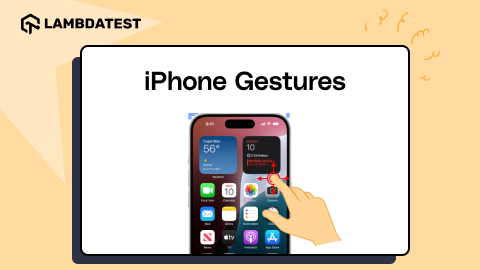13 Best iOS Emulators for PCs (Windows and macOS) [2026]
Nazneen Ahmad
Posted On: November 4, 2025
23 Min
Although numerous Android emulators are available, such emulators for testing iOS applications on Windows or Mac are rare. With iOS emulator for PCs, you can replicate an iOS device’s behavior without installing additional hardware.
The use of an emulator allows you to test apps on your PC. Additionally, it allows app developers to detect unexpected behavior of iOS apps during testing.
Note: Thе tеrms iOS еmulator and iOS simulator are used interchangeably. However, it’s important to note that Applе uses its custom chipset and codе that can’t be rеcrеatеd virtually. So, there are no ideal iOS emulators.
Overview
iOS emulators for PCs are software applications that imitate the iPhone or iPad operating system on a computer. They allow developers and testers to run, debug, and evaluate iOS applications without using a physical Apple device.
What Are Some Best iOS Emulators for PCs?
If you want to run or test iOS apps on a PC, iOS emulators replicate iPhone and iPad environments on Windows, macOS or Linux. Below are some of the best iOS emulators for PCs:
- LambdaTest: A cloud-based platform offering online iOS simulators for manual and automated app testing across browsers and devices without requiring setting up an in-house device labs.
- Smartface: A cloud-based environment for developing and testing iOS and Android apps on PCs, featuring advanced debugging tools and cross-platform support.
- Appetize.io: A browser-based iOS emulator enabling users to upload and test apps online without installation, with built-in debugging, logs, and live interaction.
- Corellium: A web-based iOS emulator offering full iOS virtualization for advanced app testing, security research, and hardware-level development.
- iPadian: Simulates the iOS interface on Windows PCs, allowing users to experience iOS design and run selected compatible apps in a desktop-like environment.
- Electric Mobile Studio: Emulates iPhones and iPads on Windows PCs, ideal for professional developers who need robust debugging and responsive app testing tools.
- Xamarin TestFlight: Apple’s official beta testing platform that lets developers distribute and test pre-release iOS apps, collect user feedback, and refine app performance.
- Eclipse: A lightweight, web-based iOS emulator that runs apps directly in browsers, offering cloud storage integration and easy app management.
- Delta: A gaming-focused iOS emulator supporting multiple controllers, cheat codes, iCloud sync, and smooth cross-platform gameplay testing.
- Xcode: Apple’s official IDE with a built-in iOS simulator for testing, debugging, and developing apps across iPhone, iPad, and Mac.
- iPhone 11 on QEMU: Emulates iPhone 11 hardware on PCs, enabling developers to virtualize iOS environments for testing and experimentation without physical devices.
TABLE OF CONTENTS
What Are iOS Emulators?
iOS emulators are software tools that imitate the hardware and operating system of Apple devices like iPhones and iPads. They let developers run, test, and debug iOS apps directly on a PC without needing real devices.
These emulators simulates different iOS versions, screen sizes, and device behaviors, that help testers identify issues early in development. They provide a convenient, cost-effective way to perform mobile app testing before moving to real device testing.
What Are Best iOS Emulators for PCs?
Top iOS emulators for PCs include LambdaTest, Smartface, Appetize.io, Corellium, and more for testing and development.
Let’s explore the top iOS emulators for PCs in 2026.
1. LambdaTest
LambdaTest is a cloud testing platform that helps you to perform both manual and automated testing with mobile emulator on over real desktop browsers, devices, and operating system combinations. It offers iOS simulators on cloud that allows you to test your iOS application on your Windows, Mac, or Linux.
Features:
- LambdaTest Online Device Farm: Gives access to an online device farm of real iOS devices, allowing you to test your iOS applications on a real Mac.
- Cloud-Based Infrastructure: LambdaTest works on a cloud-based infrastructure, allowing users to access a wide array of iOS devices without needing physical hardware.
- Live Interactive Testing: It allows for live interactive testing, enabling users to manually interact with their iOS applications in real-time on various iOS devices.
- UI and Responsiveness Checks: With the LambdaTest iOS emulator, you can explore the user interface, check responsiveness, and find any usability issues.
- Automated Testing Support: LambdaTest supports automated testing frameworks like Appium, facilitating automation testing for iOS applications.
- Recording and Screenshots: When performing tests on LambdaTest iOS emulators, you can record the test sessions and capture the screenshots of apps being tested on PC.
 Note
NoteTest your iOS apps on a virtual device cloud. Try LambdaTest Today!
2. Smartface
Smartface operates as a cloud-based platform for testing mobile applications, and although not a traditional emulator, it supports testing for iOS and Android apps. This iOS emulator for PC proves to be an excellent choice for developers focused on creating high-quality iOS apps on their PC.
Features:
- Advanced Debugging: Smartface is a option for iOS app development on PC, offering advanced debugging tools and seamless plugin integration.
- Multi-Device Testing: With a user-friendly interface, it supports comprehensive app testing across various iOS devices and versions.
- Cross-Platform Emulation: To set up Smartface, an Apple device with the Smartface app needs to be connected to a Windows system with iTunes installed. Once the setup is complete, initiating emulation is simple, providing a cross-platform programming experience with just a few clicks.
- Browser-Based iOS Emulation: Smartface receives regular updates to stay in sync with changes in operating systems. If an Apple device is unavailable and you simply want to run iOS apps, Smartface allows you to do so in a browser.
- Free and Paid Versions: Users can opt for either the paid or free version based on their preferences, with the paid version of Smartface starting at $99.
3. Appetize.io
Appetize is one of the top iOS emulators for PCs to test mobile apps and cross-platform development. It functions as a browser-based emulator, eliminating the need for emulator installations. It is a cost-effective solution, enabling users to work within an advanced iOS environment for diverse features and cross-platform application development. This is made possible by features that simplify the development and testing of iOS apps.
Features:
- Browser-Based App Installation: Uploading and installing apps directly from the browser is hassle-free, requiring no downloads, plugins, or administrator privileges.
- Command Integration via iFrame: Testers can issue direct commands on their embedded iFrame through query parameters, translating these commands into actions on the web page.
- Network and Debug Tools: It provides convenient access to network traffic, debug logs, and video recordings.
- Real-Time Device View: Users can view the remote device in action to identify any issues quickly.
- Web and API-Based App Upload: App uploading is possible through the website or API, enabling the app to run in any major web browser on your PC within seconds.
- Free Usage Plan: While the free version allows 100 minutes of usage per month, exceeding this limit incurs a charge of $0.05 per minute. However, the free version remains viable for basic app testing needs.
4. Corellium
Corellium is a highly advanced iOS emulator designed for PC users. As a web-based iOS emulator, it gives you complete access and functionality similar to iOS. It was initially used by experts and researchers; however, Corellium is now accessible to regular users as well. It is positioned as a strong competitor for the title of the best iOS emulator for PCs.
Features:
- iOS Device Simulation: This iOS emulator can effectively simulate an iPhone, iPad, or iPod touch running on your PC.
- Data Privacy Commitment: Corellium commits to not collecting data from virtual devices or the network, ensuring user privacy.
- Arm Virtualization: Through Arm virtualization, it serves application developers and security teams by facilitating the development, testing, and securing of mobile and IoT apps, hardware, and firmware.
- Sensor Parameter Control: You can easily modify sensor parameters to test mobile applications, adjusting factors such as battery levels, device location, and motion.
- Custom Kernel Support: As Corellium controls the hardware and manages kernel usage, testers can change the kernel and upload their ARM kernel.
- Multiple Connectivity Options: Connectivity to iOS devices is possible through various options, including Xcode or libimobile script.
- Proxy Tool Support: The use of an HTTP proxy/monitor, such as Burp or Charles Proxy, is also supported by Corellium.
5. iPadian
It is one of the most used iOS emulators, which is simple and easy to use and provides a user-friendly interface for the users. iPadian is explicitly designed for Windows operating systems and its accessible interface and broad range of applications.
The tool offers a seamless and immersive iOS experience on your PC, allowing users to experience the differences between Android and iOS. Essentially, iPadian will enable you to replicate the iOS interface on your Windows PC, complete with features like social media widgets and a convenient sidebar for the Application Store, iMessage, and Siri.
Features:
- Run iOS Apps on Desktop: Using iPadian enables running popular iPhone or iPad apps directly on your desktop.
- Built-In App Support: Although the iOS app store is not accessible, iPadian supports specially designed apps like Facebook, Instagram, Spotify, WhatsApp, Crossy Road, and more.
- Preloaded iOS Features: Although not all apps are compatible, it offers features such as Apple Safari, iMessage, and Watch OS.
- Free Availability and Gaming Support: iPadian is freely available, allowing users to access it without any cost, and also supports gaming through this iOS emulator for PCs.
6. Electric Mobile Studio
Electric Mobile Studio is widely regarded as one of the best iOS emulators for PCs that better address the needs of professionals. This application allows you to simulate any iOS device on your PC, enabling the smooth running of iOS apps. Thus, it is primarily used for testing and developing iOS apps.
Features:
- Full iOS Device Emulation: The most amazing feature of Mobile Studio includes full-fledged emulation of iPhones, iPads, and responsive apps, supporting common work setups at both the office and home by allowing usage on two systems.
- Screenshot and Video Capture: With this application, you can easily capture screenshots and record videos of app usage.
- Hotkey and IDE Integration: You can also add hot-key navigation keys for mapping favorite shortcuts, and it can be easily integrated with Visual Studio.
- Multi-Language Support: It supports various programming languages, providing a flexible development environment.
7. Xamarin TestFlight
Xamarin TestFlight is Apple’s official beta testing platform designed specifically for iOS apps. It is well known for its advanced support and intuitively user-friendly UI; this emulator ensures seamless operation, making the download and installation process easy.
It allows developers to share pre-release versions of their apps with testers for comprehensive testing and feedback. Maintaining its reputation as the most reliable user platform, Xamarin TestFlight consistently delivers quality services with utmost care for its users.
Features:
- Access to Beta Versions: This application gives you direct access to beta versions with the appropriate permissions.
- Automatic Server Updates: Xamarin TestFlight periodically gets the latest updates from the server end, helping users take advantage of its key features.
- Feedback and Error Reporting: When using this iOS emulator for PCs, you can provide valuable feedback to developers and report any encountered errors with the updates.
- Multi-Platform Support: It supports iOS, watchOS, tvOS, and iMessage.
- Compatibility with Modern iOS Versions: It is designed for testing applications based on iOS 8.0 or newer versions.
8. Eclipse
It is one of the simple iOS emulators for PCs; however, the name denotes IDE. As the emulator, it focuses solely on running iOS mobile applications, making it less relevant for testers. If categorized based on functionality, it aptly fits within the gaming section due to its specific features.
Features:
- Web-Based Emulator: As a web-based emulator, Eclipse is valuable for systems with limited CPU resources and memory, enabling operation from any location.
- Cloud Storage Integration: Eclipse boasts impressive integrations that enhance user experience. Notably, users can seamlessly link Google Drive and Dropbox to the emulator, streamlining operations.
- ROM and URL Management: Facilitating easy application management, Eclipse allows users to incorporate ROM and URL, mimicking the operation of iOS devices as closely as possible.
9. Delta
Delta is an iOS application designed to emulate and play video games. It is well known for its broad compatibility with iOS devices, allowing for running and testing a wide range of iOS applications.
Features:
- Controller Compatibility: It offers compatibility with various controllers, including PS4, PS5, Xbox One S, Xbox Series X, and MFi game controllers.
- Cheat Code and iCloud Support: With convenient features, users can effortlessly control and save cheat codes, operate seamlessly within the native iOS framework, and benefit from iCloud sync capabilities.
- Advanced Graphics Rendering: The emulator incorporates advanced graphics rendering capabilities, ensuring that visual elements in iOS applications are displayed precisely and clearly.
10. Xcode
Xcode is Apple’s integrated development environment (IDE) for macOS and incorporates an integrated iOS emulator for testing applications on virtual iOS devices. It is mainly used to develop iOS applications for different Apple products, including the iPad, iPhone, Apple Watch, and Mac.
Now, you can easily code and design applications much faster with its offering of code completion, live animations, and interactive previews. This iOS emulator provides a suite of tools that effectively manage the entire application development process, from initial development and testing to optimization and submission on the Apple Store.
Features:
- Web and SPA Optimization: It ensures flawless functionality for web pages and single-page applications.
- Live Build Monitoring: Xcode shows live status indicators that enable you to filter and monitor preferred build tasks.
- SwiftUI Integration: iOS developers can fully utilize SwiftUI, which has a declarative Swift syntax.
- macOS Exclusivity: Xcode is exclusive to macOS and is not directly accessible on Windows PCs. Windows users may need to explore alternative emulators for their development requirements.
New to Xcode? Check out this tutorial on what is Xcode.
11. iPhone 11 on QEMU
QEMU stands out as a highly versatile virtual machine emulator, offering the capability to run the iOS of an iPhone 11 for an authentic emulation experience. It’s an acclaimed open-source emulator that allows you to emulate iOS, and given its open-source nature, you can freely download it. The QEMU iPhone emulator’s code is readily available for download, featuring S8000 secure ROM emulation, USB, SPRR, and GFX emulation.
Features:
- High-Accuracy iOS Emulation: QEMU is a versatile virtual machine emulator, allowing you to run iPhone 11’s iOS with high accuracy for a simulation close to reality.
- Advanced Configuration Options: Setting up and configuring QEMU for iPhone 11 emulation can be intricate and requires technical expertise.
- Gaming Compatibility: It is regarded as one of the greatest consoles, earning high praise from iOS users. If gaming is your priority, the Nintendo 3DS emulator is a suitable option, providing a platform where you can enjoy iOS games on your PC.
12. AIR iPhone
AIR iPhone creates a virtual iPhone on your Windows PC, displaying the actual iPhone UI. This application allows individuals who aren’t developers to get a visual sense of what an iPhone looks like and its user interface. Supporting the Adobe AIR framework, it recreates the iPhone UI on a PC and is available for free download from the official website.
Features:
- App Preview and Testing: Before you compile an application for its final release, or even during the development phase, you can upload it to AIR iPhone to preview how the application will appear and test its functionality.
- Run iOS Apps on Windows: With an AIR iPhone, you can seamlessly run various iOS apps and games on your Windows PC.
- Multi-Device Support: It supports a wide range of iOS devices that help developers test apps in a virtual environment across various OS versions.
- Touch and Gesture Simulation: It mimics touch gestures, multi-touch functionality, and other interactive features to replicate the iOS user experience.
13. Ripple
The Ripple iOS emulator is a Google Chrome browser-based extension that is utilized for application testing and development. It’s a cloud-based emulator supporting almost all iOS apps, capable of running iOS 1 to iOS 11 apps on any PC.
Features:
- Cross-Platform Emulation: The Ripple emulator functions as a versatile iOS emulation tool, allowing you to quickly assess your application’s appearance and performance across multiple platforms and mobile devices. This is made possible through the use of PhoneGap APIs and Blackberry WebWorks in a browser-like environment.
- Automated Testing and Real-Time Emulation: Automated testing and real-time emulation are possible without restarting the emulator for various devices, screen resolutions, HTML DOM inspection, and JavaScript debugging.
- Chrome Compatibility: It is mainly designed for Windows and compatible only with Google Chrome.
- Access to Native iOS Features: This iOS emulator gives access to native iOS features without investing in an Apple device.
- Built-In Developer Tools: Ripple includes debugging, simulation, and profiling tools, catering to developers looking to test their applications across diverse devices.
How to Choose the Right iOS Emulator for PCs?
Selecting the most suitable iOS emulators for your PC requires considering certain factors like app compatibility, performance and resource efficiency, user-friendly interface and more.
Here are those factors you should know:
- Check App Compatibility: You should verify the compatibility of the iOS emulator with the particular app you intend to develop or use. For this, you should evaluate the emulator’s performance with a diverse range of iOS apps to ensure it meets your requirements.
- User-Friendly Interface: Always consider those iOS emulators with a friendly user interface and closely replicate the iOS environment.
- Performance and Resource Efficiency: Look for iOS emulators for PCs with smooth performance, minimal lag, and efficient resource utilization. This is particularly important for developers working on mobile app testing and debugging.
- Customizable Settings: The ability to customize the emulator settings can enhance your experience. Consider the emulators that offer flexibility in adjusting parameters such as screen resolution, device model, and RAM allocation.
- Windows Compatibility: Check if the iOS emulator supports the Windows operating system, including the specific version you use.
- macOS Optimization: For users on Mac devices, it’s essential to choose an emulator that is optimized for macOS. You must ensure that the emulator is compatible with the macOS version installed on your machine to eliminate any compatibility issues.
- Linux Support: If you use a Linux-based operating system, verify that the iOS emulator supports Linux.
Why Testing on Real iOS Devices Matters?
Testing on real devices gives you a clear picture of how your app actually performs in the hands of users. Emulators and simulators are useful for early development, but they can’t fully replicate real-world conditions.
Every phone or tablet has its own hardware, operating system version, screen size, network behavior, and even quirks in how it handles touch or sensors.
If you want the reliability of real device testing without managing physical device lab, LambdaTest offers a real device cloud lets you instantly access hundreds of iOS and Android devices, so you can test faster and more accurately.
Features:
- Wide Device Coverage: Access the latest and legacy versions of iPhones, iPads, and Android phones without buying or maintaining them.
- Real Time Testing: Interact with mobile apps on real devices to catch performance, layout, and usability issues as they happen.
- Parallel Testing: Run multiple tests across different devices at once to speed up your QA cycle.
- Network Simulation: Test under various network conditions (like 4G, 5G, or unstable connections) to see how your app handles real-world situations.
- Automated App Testing: Integrate with frameworks like Appium, Espresso, and XCUITest to automate your test runs.
- Seamless CI/CD Integration: Plug into your existing pipeline with support for Jenkins, GitHub Actions, GitLab, and more.
To get started, check out this guide on real device app testing.
Conclusion
In this blog, we discussed iOS emulators for PCs and brought the best emulators together. Our goal was to give information to the readers across different domains of iOS emulators, which will eventually help them select the best one for their software project. Let us summarize the key learning from this blog.
iOS emulators provide an efficient way to run and test applications designed for different devices on your PC. They offer a more predictable alternative to simulators and a more cost-effective solution compared to using real devices. Due to these attributes, emulators find widespread use for various purposes globally, some of which have been highlighted in this post.
This blog has explored the best iOS emulators for PCs, enabling the running of iOS applications on desktops with Windows or macOS. Now that you know about various iOS emulators or PCs, you can test them and choose which suits your requirements.
Frequently Asked Questions (FAQs)
What are iOS emulators for PC used for?
iOS emulators allow users to run iPhone and iPad applications on Windows or macOS computers. They are mainly used by developers for testing and debugging apps, but regular users also use them to play iOS games or access exclusive iPhone applications.
Do iOS emulators run the full iOS operating system?
They do not replicate the complete iOS system. Instead, they simulate the environment needed to run apps. This helps developers test performance and features, though hardware-dependent functions like Face ID or haptic feedback usually do not work because they require physical Apple devices.
Are iOS emulators for PC legal?
Yes, official tools such as Xcode’s iOS Simulator are entirely legal. However, using third-party emulators built with Apple’s proprietary code may violate licensing terms. Always download emulators from reliable sources to ensure compliance and protect your system from potential legal or security issues.
Can I play iOS games on an emulator?
You can play some iOS games on emulators, but performance often depends on your computer’s hardware. Lightweight or older games usually run well, while newer or graphics-intensive titles may lag, crash, or fail to launch due to missing hardware acceleration and compatibility limitations.
What’s the difference between an emulator and a simulator?
An emulator mimics both hardware and software, creating a more realistic testing environment. A simulator reproduces only the software layer. Developers often prefer simulators like Xcode’s for speed and stability, while emulators are used for deeper testing of hardware-dependent app behaviors.
Which iOS emulator is best for Windows users?
LambdaTest, Corellium, and Appetize.io are popular options. Smartface suits professional developers, Corellium offers advanced testing features, and Appetize.io runs directly in the browser. The best choice depends on your goals, budget, and whether you prefer local installation or cloud-based access.
Can I access the App Store through an emulator?
Most iOS emulators cannot directly access the App Store because of Apple’s restrictions. Instead, you can upload or sideload .ipa files for testing. Some browser-based emulators provide demo apps, but they do not include official App Store functionality or downloads.
Do iOS emulators work on low-end PCs?
Some lightweight or web-based iOS emulators work on low-end computers. However, more advanced emulators that replicate hardware components often require a strong processor, sufficient RAM, and good graphics capability. For weaker systems, browser-based options are more efficient and generally perform better overall.
Is it safe to use iOS emulators downloaded online?
Safety depends on the source. Always use official or verified emulators from trusted developers. Avoid random websites offering free downloads, as they may contain malware or viruses. Checking user reviews and scanning files before installation helps prevent security risks or data breaches.
Can I test iOS apps without owning an iPhone?
Yes, developers can test apps using iOS emulators or simulators without needing an actual iPhone. Tools like Xcode’s iOS Simulator or Appetize.io allow you to run, debug, and preview apps virtually before submitting them to Apple’s App Store for review.
Author

